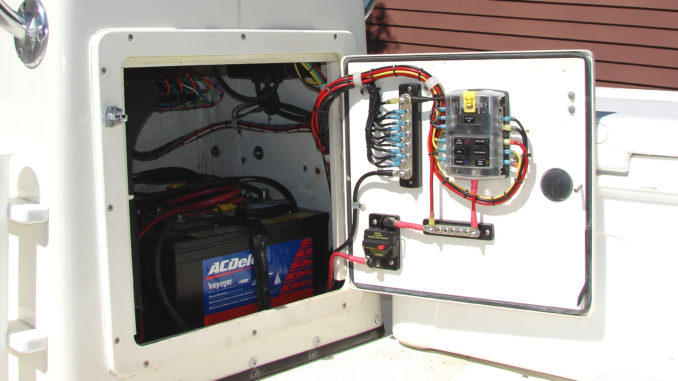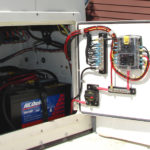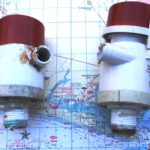
Make sure things are in order before first cast
Winter fishing, especially late in the winter once the days start warming, can be some of the best and most fun of the year, plus, you are ready to shake off winter and get outside. Unfortunately, it is also one of the most dangerous times to be on the water.
While our weather has been strange for the past couple of years, the typical North Carolina winter begins easing off by mid-February. It won’t quickly change into spring, but warm fronts that would blow through overnight in January might now hang on for several days. Ol’ Man Winter is losing his grip, and there are more and more breaks in the weather that are warm and inviting to go fishing.
These days get us fired up and out on the water. Sometimes, the quick warming and desire to be fishing dulls our senses, and we rush to get back on the water and aren’t properly prepared. It only takes a little longer and a little more effort to prepare properly and help avoid most issues on the water.
Whether in a stream, river, lake, bay, sound, creek or the ocean, water temperature doesn’t change as quickly as the air. It didn’t cool as quickly in the fall, and it won’t warm as quickly moving from winter into spring. We are so ready to escape our cabin fever we sometimes get excited and forget this. Potential problems lurk on those bright, sunny, days when the air is warm but the water isn’t.
The shock is bad enough if you get splashed or otherwise get wet on a boat, but the situation quickly escalates to life-threatening if someone falls overboard. Unfortunately, we lose fishermen each year because they rushed and weren’t properly prepared. This would be a good year to break that chain. By being properly prepared, planning ahead, making a plan that is shared with someone not on the trip and fishing that plan, we can make it happen. We just have to do things right — every time.
Don’t think it can’t happen to you. None of us are 10 feet tall and bulletproof. We lose a fisherman or several every winter. Not paying attention or slack preparation can allow a situation to go south in the blink of an eye.
What can a fisherman do to make himself safer in cold water? Actually, a handful of things come to mind, and several are imperative when fishing in late winter.
First, pay close attention to the weather, and don’t head out in marginal conditions or when conditions are expected to deteriorate. While it might seem like spewing sacrilege to some, the truth is, fishing just isn’t that important. If the conditions aren’t good, wait and go later; nothing is worth risking your life. Once on the water, continue to monitor the weather. It is known to change quickly, and on the coast, a forecast is just a best guess at what might happen.
Weather will dictate how you should dress. With the diversity of new hi-tech fabrics and clothing, you should never leave the dock with the possibility of being either too cold or too warm. Layering is the key, so clothing can be removed if the day warms. A base layer that will wick perspiration away from the skin is the first step. Mid layers can add to the insulation or be lighter for easier movement. The part most people see is the outer layer, which can vary from basic outdoor wear to rain gear or storm gear and paddling jackets or even dry suits for kayak fishermen. Unless you are in a dry suit, carry a change of clothes in a watertight container.
Formulate a plan for your fishing trip, write it down and leave it with someone responsible who will send help if you don’t return on time. It’s called a float plan and should be a synopsis of where and when you plan to launch, where you plan to go, and when you plan to return. It should also have a description and registration number of your boat, plus your cell phone number and whether or not you are carrying a Personal Locator Beacon, EPERB, VHF radio or other means of tracking or contacting you. I suggest including a description of your vehicle (and trailer), so it is easy to check and see if it is still at the marina or ramp.
Your float plan should be as precise as possible and followed as closely as possible. If you deviate from your float plan, notify the person monitoring it. Texting to their cell phone allows leaving the changes in a readable form. Texts are more reliable than voice mail, as they usually transmit in marginal reception areas, when voice mail might be garbled or delivered late. The N.C. Wildlife Resources Commission has a downloadable float-plan form in the “Boating” section of their website at www.ncwildlife.org.
Carry a VHF or weather radio and check the forecast occasionally. Mistakes and oversights that would only be uncomfortable during warmer months quickly escalate to life threatening during the winter.
Preventive maintenance is always important, but even more during cold weather. Little things that were minor annoyances in warm weather may prevent needed equipment from working in extreme cold. Grease and oil are much thicker and do not flow readily. Cold grease could prevent shifting, throttle and steering cables from moving. Batteries are susceptible to cold, too. The battery that started the outboard fine through the fall may be weak with the temperature hovering around freezing.
It is especially important to be sure all pumps and thru-hulls are in good working order. Baitwell and bilge pumps are plastic and may freeze, crack and leak.
Checking safety equipment is part of preventive maintenance. Hopefully, you never need flares, but they need to work if you do. An orange distress flag or signal mirror is not required in North Carolina, but both are wise additions. Check your first-aid kit too, just to be sure. It isn’t required, but if you’re going to carry the box, have all the parts and pieces.
It is always a good idea to carry basic tools, some essential spare parts, jumper cables and a tow rope; this is especially important during cold weather. Things happen, and with the shorter days, it may be better to rig a makeshift repair and begin slowly making your way in before dark than to wait for assistance. These parts and tools may also be used to help a fellow boater.
During the winter, the number of fishermen on the water and the odds of flagging down someone for assistance are greatly diminished. Fishermen should look out for each other and offer assistance when possible. The lack of other boaters during winter is an excellent selling point for a Towboat US or Sea Tow membership. They make great gifts.
Be prepared, take care and enjoy catching fish all year.






Be the first to comment